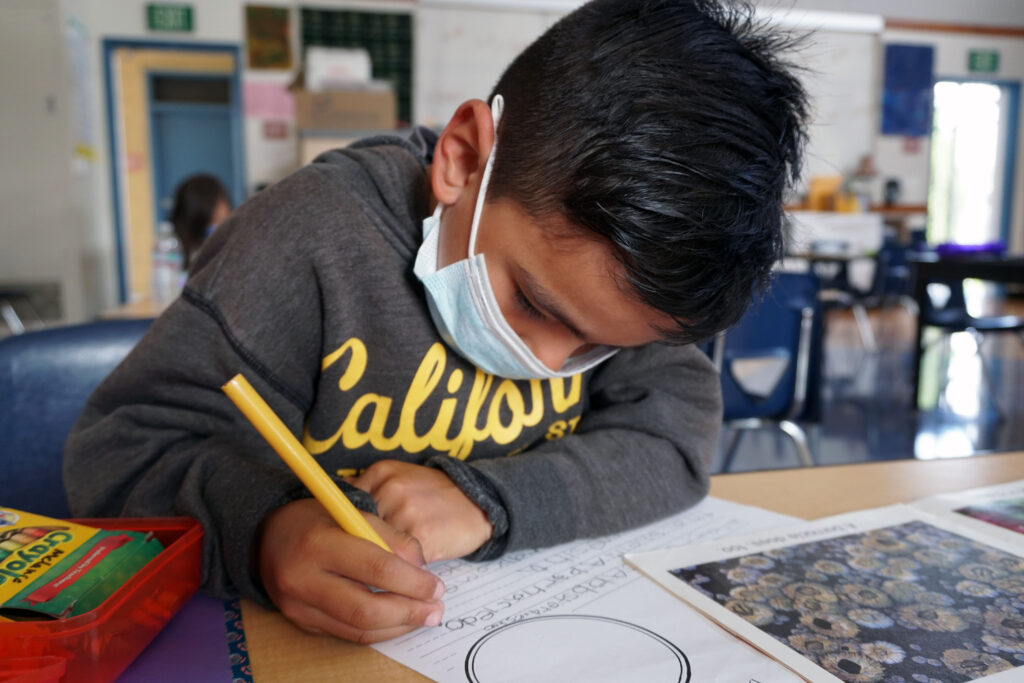 Credit: Andrew Reed/EdSource
Credit: Andrew Reed/EdSource Credit: Andrew Reed/EdSource
Credit: Andrew Reed/EdSourceParents who fear their child will not thrive in first grade because they skipped kindergarten during the pandemic or because they struggled too much with remote learning should reach out to their school.
A newly passed law, Assembly Bill 104, authored by Assemblywoman Lorena Gonzalez, gives parents the right to request a consultation regarding grade placement. That means parents can now help decide which grade best fits their child, although the final decision rests with the district.
“Kids who struggled with distance learning during the pandemic shouldn’t be penalized for falling behind during such a difficult year,” Gonzalez said.
Missing early milestones in reading and math skills, some worry, may hold students back as the workload increases.
“Some districts will push them into first grade just because they are age-eligible, which is a huge disservice to those children,” said Paula Merrigan, a transitional kindergarten teacher in Castro Valley Unified. “It sets children up for failure if they are not prepared both socially and academically. No child should feel like a failure.”
Read more:
To get more reports like this one, click here to sign up for EdSource’s no-cost daily email on latest developments in education.


)
Comments (4)
Comments Policy
We welcome your comments. All comments are moderated for civility, relevance and other considerations. Click here for EdSource's Comments Policy.
Miguel 2 years ago2 years ago
If parents don't like their child's public school grade placement, they can enroll their child in a typical private, where half the Kindergarten class is already seven-years-old on the first day of class. Parents are using academic "red shirting" and unnecessary grade retention to give their kids what they *think* is an edge over the competition, but in reality leaves their kids worse off. Nobody wants to be the senior in HS who can buy … Read More
If parents don’t like their child’s public school grade placement, they can enroll their child in a typical private, where half the Kindergarten class is already seven-years-old on the first day of class. Parents are using academic “red shirting” and unnecessary grade retention to give their kids what they *think* is an edge over the competition, but in reality leaves their kids worse off. Nobody wants to be the senior in HS who can buy beer. Kids can catch up to grade level with parental involvement at home. Developmentally, it is not good for a child to be a year and a half (or more) older than the youngest children in his class.
Brenda Lebsack 2 years ago2 years ago
I like how Assemblywoman Gonzalez gives parents the right to request a consultation regarding grade placement, which means parents can now help decide which grade best fits their child, although the final decision rests with the district. It would have been even better if Assemblywoman Gonzalez would have passed a law to give parents rights to put their children in a school where they did not have to miss in-person instruction time altogether. … Read More
I like how Assemblywoman Gonzalez gives parents the right to request a consultation regarding grade placement, which means parents can now help decide which grade best fits their child, although the final decision rests with the district. It would have been even better if Assemblywoman Gonzalez would have passed a law to give parents rights to put their children in a school where they did not have to miss in-person instruction time altogether. Those schools exist, but often they are not public schools. For the sake of equity, maybe parents’ decision rights needs to broaden further.
Replies
Christopher A Ross 2 years ago2 years ago
Parents didn't have a choice. My son who is 11 refused to go online. We fought day and night. I tried to speak to the district and principal. No one returned my calls so I disenrolled him. Found a great in-person Catholic School. At the end of the year, he score 92 and 96 percent. Higher than most 11 year olds. Parents need to get back in the … Read More
Parents didn’t have a choice. My son who is 11 refused to go online. We fought day and night. I tried to speak to the district and principal. No one returned my calls so I disenrolled him. Found a great in-person Catholic School. At the end of the year, he score 92 and 96 percent. Higher than most 11 year olds.
Parents need to get back in the mix. We need to get our rights back to opt out of any teaching style we don’t agree with. As taxpayers and homeowners, we are funding these schools. We deserve better.
Pilar Mejia 2 years ago2 years ago
Yes, parents should always have a say; no one knows their child better, but the "not ready" is pedagogically unsound. It is not research based. Classrooms should not be "one size fits all" in any grade. The comment you chose from the transitional kindergarten teacher is purely anecdotal! My kinder or 1st grade or even 3rd grade class and my son's (who is also a teacher) would never set any child up for failure because … Read More
Yes, parents should always have a say; no one knows their child better, but the “not ready” is pedagogically unsound. It is not research based. Classrooms should not be “one size fits all” in any grade.
The comment you chose from the transitional kindergarten teacher is purely anecdotal! My kinder or 1st grade or even 3rd grade class and my son’s (who is also a teacher) would never set any child up for failure because it is a cooperative, nurturing, discovery based environment !